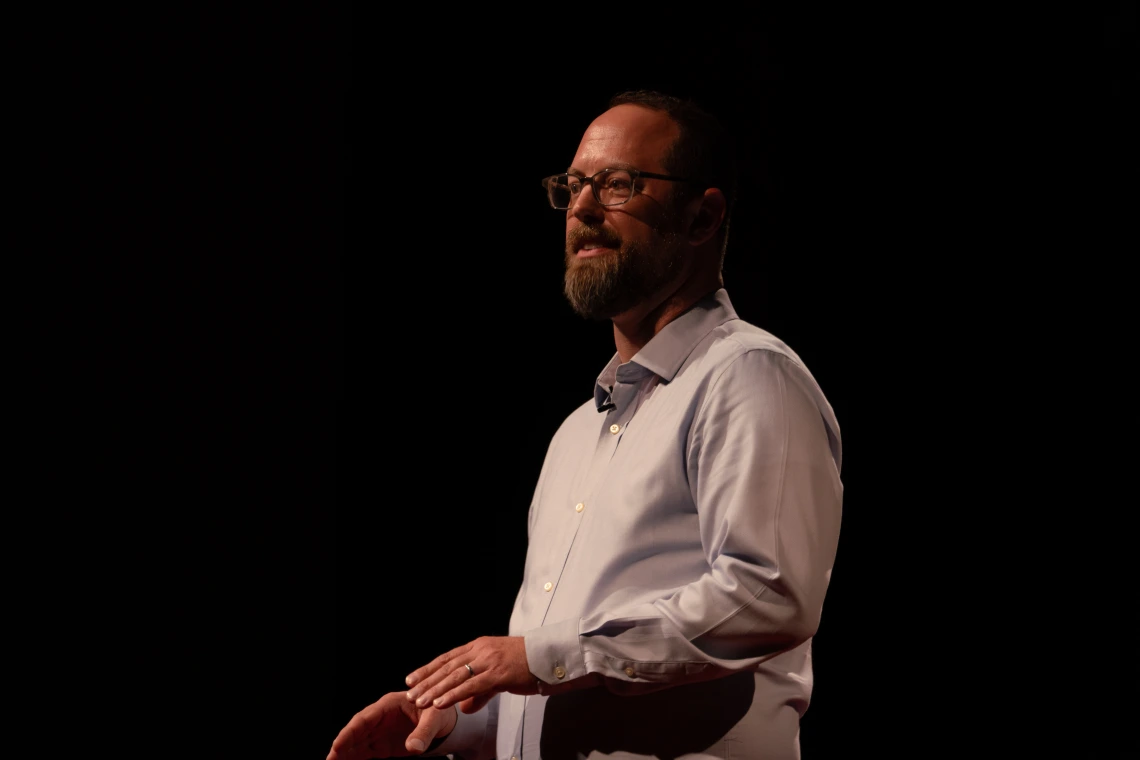Ladd Keith named 2025 Western Planner of the Year

Ladd Keith, associate professor of planning, giving a TEDx talk on heat resiliency last fall.
Arielle Pagac
The Western Planner organization has named CAPLA Associate Professor Ladd Keith its 2025 Planner of the Year, honoring his pioneering leadership in climate-responsive planning and community resilience across the American West.
The award recognizes planners who demonstrate fortitude, skill and advocacy for the profession. It was presented during the Western Planner Conference in Bend, Oregon in October.
“It’s an honor to be recognized by the planning profession for this award, especially during a period when national priorities have shifted away from addressing climate change and its impacts,” Keith said.

On the same day as being named the 2025 Planner of the Year, Ladd Keith, center, was recognized by CAPLA Dean Nancy Pollock-Ellwand, left, and U of A Provost Patricia Prelock, right, during the University of Arizona's Luminaries Outstanding Faculty Awards.
Keith was also named a 2025 Distinguished Scholar by the University of Arizona and was recognized during the university’s Luminaries Outstanding Faculty Awards in October.
Keith, who teaches in the School of Landscape Architecture and Planning, directs the university’s Heat Resilience Initiative. One of his research areas focuses on reducing the dangers of extreme heat in rural, border and tribal communities across Arizona and New Mexico through the Climate Assessment for the Southwest (CLIMAS), a NOAA Climate Adaptation Partnerships program.
“The Western Planner organization supports rural, county, tribal and small-town planners across the U.S. West,” Keith said. “This recognition shows the importance of planning for climate change in communities of all sizes, not just our large cities, which often receive more attention.”
Lauri Macmillan Johnson, director of the School of Landscape Architecture and Planning, said Keith’s impact has been transformative for the field and the college.
“Ladd Keith has fundamentally reshaped urban planning by making heat resilience a core priority in climate adaptation,” she said. “He has secured over $37 million in federal research funding, including the $25 million DOE Southwest Urban Corridor Integrated Field Laboratory (SW-IFL), the largest grant ever awarded to CAPLA.”
She added that Keith’s work bridges scholarship and real-world solutions.
“His ability to connect rigorous research with actionable policy solutions makes him a transformative leader in the planning profession,” she said.
Keith said much of his success stems from collaboration.
“Most of our climate planning research follows a transdisciplinary or coproduction approach, meaning we involve practitioners throughout the entire research process,” he said. “This helps ensure the research we do is relevant and usable by the communities and decision-makers we serve as a land grant institution.”
Under Keith’s leadership, CAPLA has become a hub for climate adaptation expertise. Johnson said his “collaborative ethos extends globally” through his work on the WHO/WMO Global Heat Health Information Network and through microcampus programs in Peru and Ecuador that expand access to sustainable planning education.
“This recognition underscores a paradigm shift. Climate resilience is no longer optional, it is central to planning in the West,” Johnson said. “Ladd’s work has redefined planning priorities by integrating public health, egalitarian ideals and climate science into urban design and governance.”
Looking ahead, Keith said he’s excited to continue advancing local and international partnerships through the Heat Resilience Initiative.
“We will continue to partner with communities across Arizona to address increasing extreme heat hazards,” he said. “We’re also collaborating more internationally now, as there are many heat resilience innovations from Arizona to share and lessons we can learn from other places.



